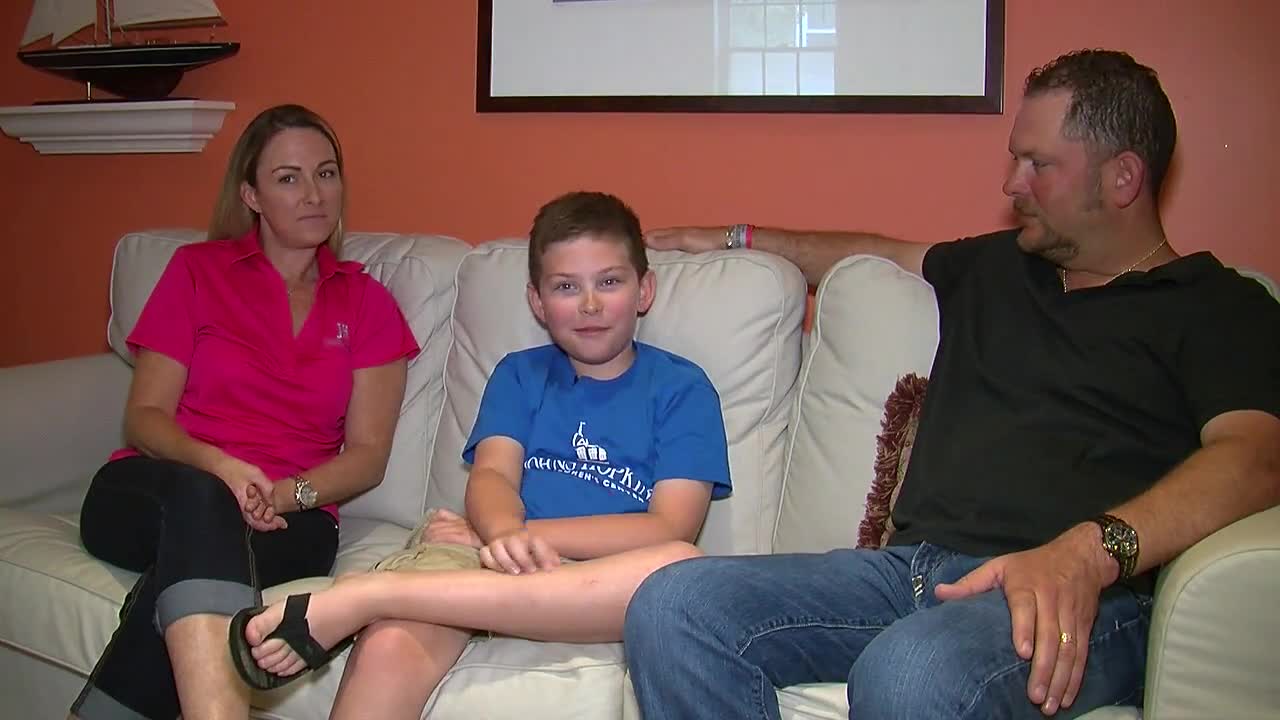A 10-year-old boy is recovering at home, after doctors at Johns Hopkins Hospital fixed a rare vascular problem in his back. They’re hoping the treatment might work on more patients.
The pain in John Kemp, Jr.’s back and legs started when he was just four years old.
“He never got better. He kept getting gradually worse,” said his father, John Kemp, Sr.
The condition meant the boy could not spend full days at school. The family has pictures of him in Halloween costumes, riding in a wheelchair.
“The hardest thing about it is just the pain,” John, Jr. said. “I used to want to do football but I couldn't because I might get hit in the back.”
Plus, there were no answers, despite visits to doctors’ offices, along with MRIs and other tests.
“It was frustrating and I didn't understand why I was going to the doctors and no one gave me an answer,” John, Jr. said.
The Kemps live in West Palm Beach, Florida. John Kemp, Sr. is a firefighter.
It might have been easier if they knew what was wrong with his son, who is now 10.
Instead there was nothing but frustration for more than six years.
“You've got to be the rock,” he said. “Long car rides and you come back because she was crying three or four times a day, and he was in pain all the time.”
“If I could even tell you the hours that I would just read and I would research,” added John’s mother, Jennifer Kemp. “And the phone calls and just I can't even tell you my husband would find me at night in the corner on my phone just reading, putting in the symptoms and what can this be.”
The boy's medical records take up an entire kitchen table.
Finally their pediatrician had seen enough. He asked the family to gather up all the boy's tests, and send them out to any hospital that would look at them.
“Everybody knew there was something but nobody knew what it was,” Kemp Sr. said.
They'd been to hospitals all over Florida, and even one as far away as Boston.
Back home in West Palm Beach, the phone rang.
“So we ended up back home and about a month later I was at work again and my wife got a call and she said ‘You're never going to believe it, Johns Hopkins called us.’"
One of the doctors from Hopkins had seen a French medical journal from the 1970s, which described a similar condition to what John, Jr. had -- an extra blood vessel that had formed between his kidney and his spine.
“It was basically vessels in his spine that were putting extra blood and putting too much pressure on his spinal cord,” Kemp, Sr. said.
The condition is so rare it doesn't even have a name. It had been on his MRIs for all those years, but other doctors dismissed it as “artifact” -- which is something like static – except this artifact kept showing up year after year.
“And he says ‘I found it. It's never been done this way - would you please let me try and correct this?’" Kemp Sr. said.
So the family took a trip to Baltimore. And John, Jr. had a surgery called an "embolization" -- doctors inserted titanium coils into the extra vein, essentially choking it off.
“Up until this last year he couldn't be on his feet more than 30 minutes or he would be in a wheelchair,” Kemp, Sr. said.
Now he can be out and about for hours, walking, running and playing on what he calls his new legs.
“The problem with john of course was a very unusual problem so it's not surprising that it took a long time to figure out what was going on there,” said Dr. Ryan Felling, an expert on pediatric circulation issues at Johns Hopkins Hospital
He says the key to helping patients like John, Jr. is the Johns Hopkins’ collaborative atmosphere.
“One of the things at Hopkins is we have a lot of people who are very sub-specialized in particular areas so they have a lot of knowledge about something,” Dr. Felling said. “And being able to go to them and bring them in on cases is a huge help.”
John, Jr. has new medical issues have come up since the surgery, including problems with his thyroid gland.
“I would love to say that we're done and we're complete and that's it but honestly i don't know that that's the case. I can only hope that that's what happens,” Jennifer Kemp said.
But it still could be a medical miracle -- and if it is, it's one the family has worked toward for more than six years.
“I really really want people to know that if you don't give up you will find your answers," she said.
Johns Hopkins Hospital has already gone back through its medical files, looking for other patients who had similar, undiagnosed problems like John Jr. had.
The family says they’ve been told the hospital has already found at least three other patients, and other hospitals are starting that process as well.
Donate to the John Kemp Jr. medical fund, visit the GoFundMe site here.




